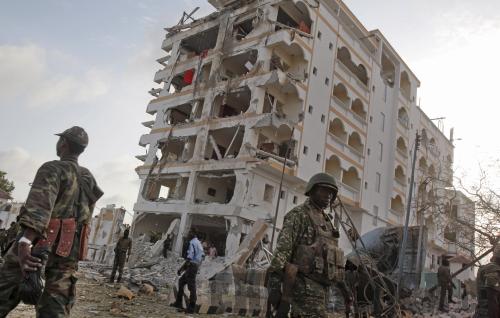| 
Conflicts in Somalia require rapid security action
Despite the fact that East Africa is widely considered one of the most volatile regions on the continent, fraught with wars, terror attacks and refugee influxes, not all commentators forecast doom and gloom.
Githu Muigai, Kenya's Attorney General, thinks three recently signed treaties are signs of gradual improvement in the response to conflict.
In August, Muigai put the final touches on three defense treaties that were then endorsed by the National Assembly, Kenya's lower house of the parliament. These are the East African Community Protocol on Cooperation in Defense Affairs; a mutual defense pact between Kenya, Uganda and Rwanda; and the Agreement on the Establishment of the Eastern Africa Standby Force (EASF).
As Kenya's chief legal adviser, Muigai's role is now to hand the ratified agreements back to the East African Community and the African Union (AU).
"The next step is depositing these instruments with their respective organs," he told ChinAfrica. "When all the partner states have deposited them, they will take the force of law in Kenya."
The three treaties could change the way the region handles emergent instability. The EASF pact, especially, is likely to have the most impact on how the region addresses its peace and security issues.
The EASF Coordination Mechanism in Nairobi serves as the secretariat for all EASF policy organs, structures and activities, coordinating EASF activities in consultation with member states and the AU.
Long process
The culmination of these defense treaties was part of a long historical process. The EASF was created in 2004 as part of AU sub-regional brigades aimed at maintaining peace and security in East Africa. Its members are Kenya, Burundi, Comoros, Djibouti, Ethiopia, Rwanda, Seychelles, Somalia, Sudan and Uganda.
But the EASF member countries were unable to present a united military presence to bring much-needed calm in Somalia, when chaos erupted there, and recently, in South Sudan, unlike the African Union Mission in Somalia (AMISOM). With bulk troop contributions from six countries, including Kenya, Ethiopia, Uganda and Burundi, the AMISOM's success in putting the militant group al-Shabaab on the back foot in Somalia has shown the advantage in pooling resources, rather than each country going alone.
With the EASF countries, the motivation to be in Somalia was more inspired by the desire to secure their own borders. Part of the problem has been attributed to the lack of a formal arrangement to coordinate military operations for the EASF without interfering with individual countries' sovereignty.
"You have to assess the impact of such agreements on [the member countries'] domestic affairs. You have got to ask yourself whether by signing you will be selling off your control. This is not specific to just this particular [set of] protocols but any international treaty," explained Muigai.
The EASF member countries have cited this "assessment" as delaying progress on adopting the EASF.
There is another problem. The EASF member countries belong to different regional economic bodies, such as the East African Community and the Common Market for Eastern and Southern Africa, and none of these blocs have a direct mandate on security roles. Initially, the EASF was coordinated by the Intergovernmental Authority on Development, but this bloc has only eight members and non-members often resisted its missions.
Endalcachew Bayeh, a security researcher at Ethiopia's Ambo University, argues that regional political instability itself was a drawback to creating the EASF. "There are serious tensions within states which require employment of resources and militaries for domestic purpose. This fact served to divert all the contributions which would have been used in the consolidation of the EASF," he told ChinAfrica. "The prospects are good, but I think the countries have been thinking twice about it because of either domestic volatility or even tensions with neighbors."
Cautious optimism
Things started looking up in June 2014, when leaders of the member countries, meeting on the sidelines of the AU summit in Addis Ababa, approved the agreement on establishing the EASF, elevating it from the status of a memorandum of understanding.
The agreement indicates the mandate for such a force, the nature of cooperation and limits to its deployment. The troops will mainly undertake emergency security operations in East Africa under the authority of the AU.
Currently, the EASF is more an organization of military experts than a grouping of soldiers, even though countries like Kenya and Ethiopia have been training soldiers specifically for it. Last year, the two countries created standby teams, ready for deployment after special training.
Lucie Sewe, the EASF Information Manager, said the soldiers are tested on their ability to provide security, stability, rapid response, disaster response and support to humanitarian facilitators.
"This is part of the field training exercise, which is one of the various stages of preparation of the force," Sewe said.
The soldiers then go through command post exercise before they are declared ready for deployment, she said, adding that once all the members create their respective standby team, they would be deployed based on UN intervention standards, after AU approval.
Even in its formative stages, the technical teams under the EASF have helped to provide regional military advice, observer missions and fact-finding missions. In Somalia, for instance, they augmented AMISOM forces in planning operations, logistics, training and medical support.
The continuing conflict in Somalia and South Sudan, though, means that despite the room for optimism, there has to be huge budgetary allocations for soldiers to take part in the EASF and move the process forward.
(Reporting from South Africa)
|